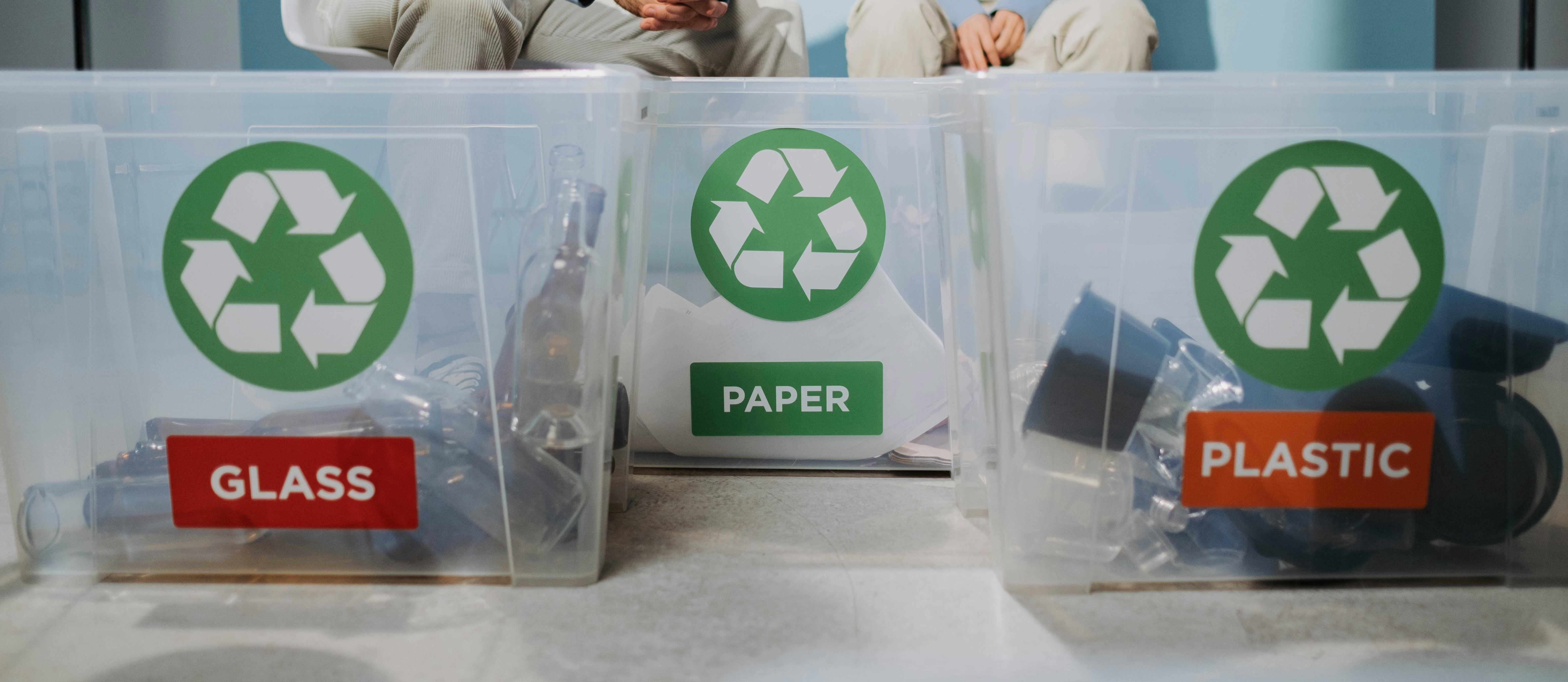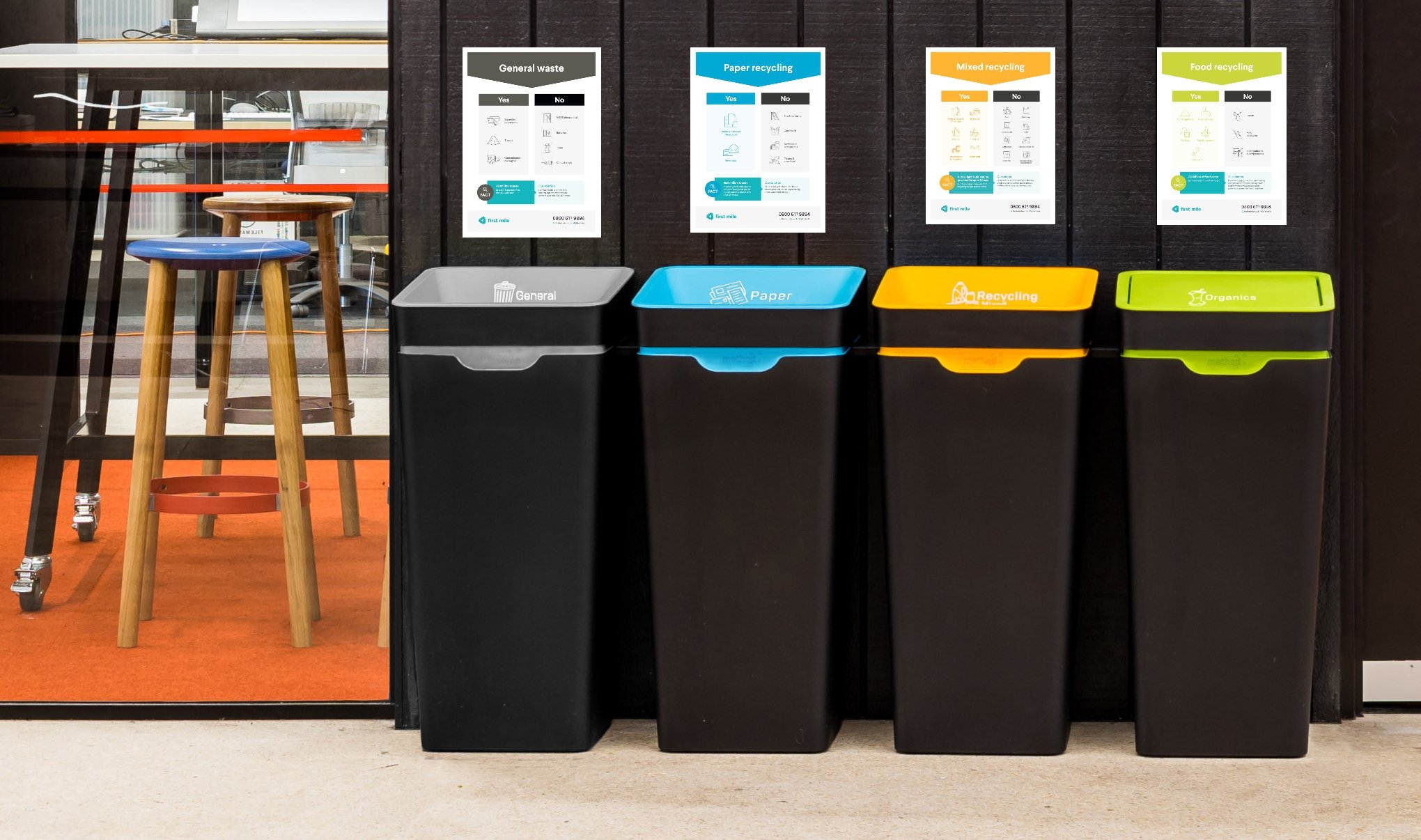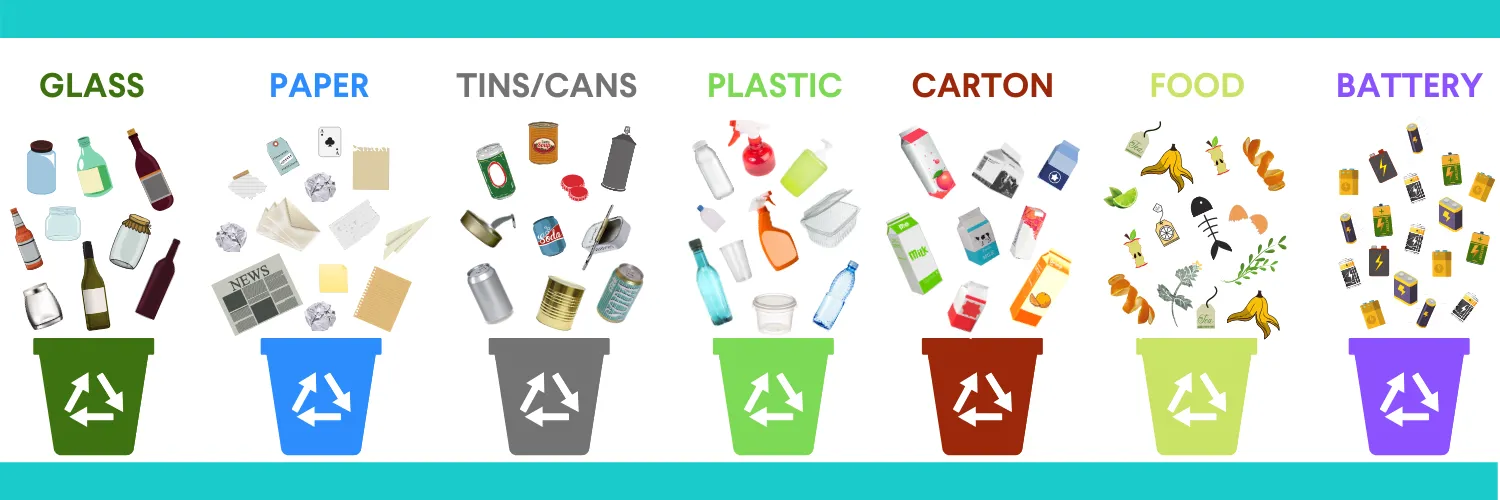England’s recycling rules for businesses have changed. And most businesses need to act now.
As of April 2025, the government’s Simpler Recycling regulations are active across England. If your business has 10 or more employees, you’re already required to separate your waste for recycling under these new rules.
Smaller firms (fewer than 10 employees) have until 2027, but for most workplaces, compliance isn’t optional. These reforms are designed to reduce confusion, improve recycling rates, and keep more waste out of landfill.
That means separating the right materials, using the correct bins, and working with a licensed waste contractor. Getting it right helps you stay on the right side of the law and can also lower your costs and boost your sustainability credentials.
This guide explains what the rules mean, when you need to act, and how to get set up with confidence.
Simpler Recycling in plain English
Recycling in England just got a whole lot simpler, and that’s the point.
The new Simpler Recycling regulations are here to take the guesswork out of what goes where. For years, rules have varied from place to place, making it hard for businesses to keep up. These reforms change that by setting one clear standard across the country.
So, what’s the aim of introducing new waste separation laws?
To boost recycling rates, reduce landfill, and make it easier for every business to play their part.
From now on, you’ll need to separate:
- Glass
- Metal
- Plastic
- Paper and cardboard
- Food waste – yes, even if it’s just a few tea bags a day
If your business handles garden waste,for example, if you’re a landscaper or run a garden centre, that’ll need separating too.
This simple idea is set to have a big impact across the UK. And with the right setup, it’s easy to get right.

Who needs to act – and when
Most businesses in England are already covered by the new Simpler Recycling regulations, so it’s time to get your setup sorted.
You must comply if:
- You have 10 or more employees (across your whole business, not just one site)
- You're based in England
- You produce any of the materials covered – glass, metal, plastic, paper/card, or food waste
The legal deadline for these larger businesses was 31 March 2025. If that’s you, your workplace should already be separating waste correctly.
You’re exempt until 2027 if:
- Your business has fewer than 10 employees
- You're classed as a micro-firm under the regulations
Even so, many smaller businesses are choosing to get ahead. Early action can cut costs, engage teams, give your business a head start with workplace recycling compliance, and show customers you’re serious about sustainability.
What’s coming next:
- 2026: Simpler Recycling rules roll out to households
- 2027: Plastic films and bags will need to be separated for recycling
Whether you're already covered or getting ready, now’s the time to make a plan.
The rules (without the jargon)
Let’s break down what workplace recycling compliance actually looks like under the new rules.
To comply, you’ll need to separate your waste into at least four main streams:
- General waste (also called residual waste) – anything that can’t be recycled
- Food waste – must be collected separately, even in small amounts
- Paper and cardboard – keep separate unless your waste collector has special approval for co-collection
- Dry mixed recycling – plastic, metal, and glass can usually go together in one bin
Once sorted, these materials must stay separated. That means no tipping them back into the same bag and no sending recyclables to landfill.
Every business is different, but the essentials stay the same: the right bins, the right collections, and a team that knows what goes where.
The Environment Agency and local councils are in charge of enforcement. They can issue compliance notices and fines if businesses aren’t following the rules.
But with a clear setup and a good waste partner, it’s easy to stay on the right track.

Five steps to get compliant now
Not sure where to start? Follow these five simple steps to get your workplace set up for Simpler Recycling.
1. Audit your waste
Walk through your site and make a list of:
- What types of waste you’re producing
- Where it’s being generated (kitchens, offices, loading bays)
- How much is produced, roughly
Quick tip: Start with your busiest areas – that’s where small changes make a big impact.
2. Choose the right bins
You’ll need clearly labelled bins for each waste stream:
- Colour-coded stickers or signage help avoid mistakes
- Place bins where the waste is generated (by desks, in kitchens, on shop floors)
Quick tip: Use photos or posters to show what goes where.
3. Train your team
A quick team briefing goes a long way:
- Explain the new rules and why they matter
- Use visual prompts or nominate “recycling champions” to help spread the word
Quick tip: Keep it light. A 5-minute huddle or kitchen poster is often all it takes.
4. Check your collections
Make sure you partner with a waste contractor like First Mile who:
- Collects each waste stream separately
- Has permission for co-collection if they’re combining recyclables
- Sends nothing to landfill
Quick : If you're not sure, ask. A good waste provider will be happy to show you how your waste is handled.
5. Keep improving
Compliance is always a work-in-progress. So be sure to:
- Spot-check bins for contamination
- Refresh training regularly
- Keep records to prove you’re following the rules
Quick tip: Build it into your routine. Monthly checks can make a big difference.
How this works in different sectors
The business recycling rules introduced in April 2025 apply across all industries, but the practical setup will vary depending on the space you work in and the waste you produce.
In offices and education settings, paper recycling tends to be the biggest stream. Placing clearly labelled paper bins by desks and printers makes it easy for staff to recycle as they go. In shared kitchens and staff rooms, food waste caddies help capture leftovers and tea bags. These sectors can benefit from dedicated paper recycling services that make separation simple.
For pubs, cafes and restaurants, food waste is a top priority. Bins should be placed right where scraps are created, in prep areas, dishwashing stations, and behind the bar. It’s also important to separate glass, cans and plastic packaging at the point of disposal. Choosing a food waste collection service that suits your layout and trading hours makes a big difference.
Retail and warehousing businesses typically handle large volumes of cardboard, which needs to be captured clean and dry in stockrooms. Some are also starting early on separating plastic films, ahead of 2027 changes. Working with a provider that offers cardboard recycling and forward-thinking solutions helps keep things compliant.
On manufacturing and construction sites, you’ll often find food waste in canteens and packaging waste in work zones. This means clear separation points across the site are essential, supported by colour-coded bins and signage. Many opt for zero-to-landfill services to ensure everything is properly sorted and diverted.
In the healthcare and public sector, the focus is on non-clinical areas like kitchens, break rooms and admin spaces. These areas still need to follow Simpler Recycling rules, alongside existing clinical waste systems. Using a general waste service that knows the sector helps maintain compliance without complicating operations.
How the rest of the UK compares
If your business operates across the UK, it’s important to know how Simpler Recycling in England fits into the broader picture.
Wales is already ahead. Since April 2024, businesses have been required to separate even more materials, including textiles and small electricals. Food waste collection is mandatory, and enforcement is already active.
Scotland introduced similar rules back in 2014, and is going further with a landfill ban for biodegradable waste coming into effect in 2025. That means food and garden waste must be diverted from landfill completely.
Northern Ireland is still in the consultation phase, but plans are underway to introduce aligned rules for waste separation in the near future.
So while England’s new recycling rules might feel like a big shift, they’re part of a much wider UK trend and likely just the beginning of further changes to come.
The upsides of getting it right
There are real business benefits to sorting your waste properly and embracing Simpler Recycling.
For starters, it helps you avoid penalties and unexpected costs linked to non-compliance. But beyond that, separating materials like food, paper, and cardboard from general waste can actually reduce your waste bills, especially with rising landfill tax.
It’s also a simple way to boost your sustainability credentials. Whether you're aiming for green certifications, attracting eco-conscious customers, or building a responsible brand, visible recycling systems send a clear message.
Plus, it brings your team on board. Giving staff the tools and knowledge to recycle well can increase engagement and make sustainability feel like a shared goal, not just a top-down policy.
In short: good for the planet, good for your people, and good for business.

Quick compliance checklist
Here’s a simple tick-list to help your business stay on the right side of the Simpler Recycling regulations:
- You’ve identified the waste your business produces
- You’ve got clearly labelled bins for each waste stream
- Your team knows what goes where – and why
- Your waste contractor collects all required materials separately
- You’re keeping records to show you’re compliant
If you’ve still got boxes to tick, First Mile can help. From audits and recycling bins for businesses to reliable collections, we’ll help you meet the new rules with confidence – and make recycling work for your organisation. Speak to our team about making your business waste smarter, greener, and 100% zero to landfill.


